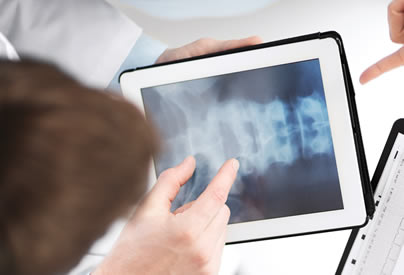You’ve probably heard of a slipped disc, or maybe a ruptured disc, that causes terrible back pain. The technical name for this injury is a herniated disc. Inside each of the discs that separate the vertebrae along your spine is an inner core called the nucleus pulposus. There is a tough outer layer of ligaments surrounding each disc. If the inner core protrudes through the outer layer, you have a herniated disc. This condition leads to pain in the back or neck, and numbness or weakness if the bulging disc presses on a nerve.
Symptoms
Pain due to a herniated disc is usually intense and sudden. The pain may be specific to the back area where the disc damage has occurred, or it can appear in the arm or leg without even having any back or neck pain. Pain that goes to other areas of the body typically involves a pinched nerve related to the herniated disc. Back pain from a herniated disc may worsen when bending, and relief often comes with lying down flat on the back and resting. If leg pain is involved, walking can become painful and awkward, with more weight being placed on the unaffected leg.
Diagnosis
Physicians such as Dr. Fischer at NYU Langone Medical Center in New York City most often require an MRI test if a herniated disc is suspected. It is the ideal way to identify a disc problem and diagnose exactly what is causing the symptoms. Sometimes a CT scan with an injection of contrast dye into the spinal area is recommended to better see the spinal column. If nerve involvement is suspected, electrical tests like an EMG may be performed to confirm nerve injury from a herniated disc.
Non-surgical treatment
Dr. Fischer, like the majority of experienced physicians, pursues non-surgical treatments as a first course of action after a herniated disc diagnosis. Conservative treatments include medication, physical therapy, activity modification and steroid injections. Medication may include pain relievers, muscle relaxants, or anti-inflammatories. If there is a great deal of swelling from the damaged disc, an anti-inflammatory spinal injection might be recommended. You will also be advised to limit certain movements like bending, twisting or lifting to give the back a break from pressure and stress on the lumbar spine.
Surgery
If conservative non-surgical treatment methods don’t successfully relieve your pain or numbness after some time, Dr. Fischer may suggest surgery as the best treatment plan. Herniated disc surgery can be a bit overwhelming for patients, but it may be the only way to fully repair the disc or nerve injuries. Surgical options usually include traditional open discectomy or the newer technique of minimally invasive discectomy. Your physician will explain the differences and make recommendations for your personal case. The goal is to get you back to your normal daily activities without pain or limitations. Contact Dr. Fischer at NYU Langone Medical Center today if you would like to learn more about herniated discs and their treatment.

